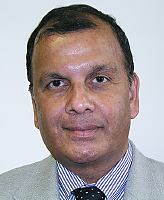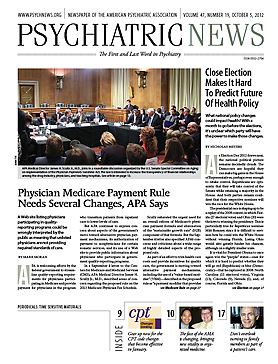Dilip Jeste, M.D.
APA is in many ways a microcosm of global psychiatry. The number of APA members who had received their basic medical degrees in countries other than the United States increased exponentially after World War II, when a large number of psychiatrists migrated here from Europe.
During subsequent decades, this migration became more diverse and included most of the world’s countries. Around 1970, the topic of what were then called foreign medical graduates (FMGs) became an important issue for APA. A session at APA’s 1972 annual meeting in Dallas was devoted to FMGs—“another of APA’s neglected minorities, one now claiming a greater share of professional attention, resources, and understanding than it has currently been receiving.” Approximately one-third of psychiatry residents in approved training centers at the time were FMGs. The symposium stated eloquently that “buried within these large numbers are innumerable and enormously complex personal, organizational, national, and international problems.”
Around 1990, the term FMG was changed to international medical graduate (IMG). In 1991 the APA Committee on IMGs launched a newsletter titled The International Psychiatrist; it continued its run until 2005. One of the areas of concern for this committee was a lack of representation of IMGs in leadership positions. It found that only 8 percent of various council and committee members were IMGs, while they comprised about 24 percent of the APA membership. The annual George Tarjan Award was initiated to recognize an individual who has made significant contributions to the enhancement of the integration of IMGs into American psychiatry. A number of IMG leaders have received this award during the past two decades.
Currently 25 percent of APA members are IMGs, and they come from 148 countries. The largest proportions of the IMG members are from India (20 percent), United States (14 percent), Pakistan (6 percent), and the Philippines (5 percent); 37 percent of IMG members are women. To date, seven of the 139 APA presidents received their medical education outside the United States and Canada. Adolf Meyer (1927–1928) was the first of four APA presidents who graduated from schools in Western Europe (in Meyer’s case, Switzerland). George Tarjan (1983–1984) was the only president from Eastern Europe (Hungary), Rodrigo Muñoz (1998–1999) the only one from South America (Colombia), and yours truly (2012–2013) the only one from Asia (India). I expect that the remaining continents will be represented at the APA presidency level in near future.
Below, Nyapati Rao, M.D., who has contributed significantly to the training of IMGs, summarizes succinctly the present status of IMGs in APA.
Nyapati Rao, M.D.
IMGs are graduates of non-LCME-accredited medical schools outside the United States, Canada, and Puerto Rico. There are two categories of IMGs: non-U.S. citizens who received their medical education in their native countries (F-IMGs) and U.S. citizens who received their medical education abroad (US-IMGs). The US-IMGs constitute 20 percent of IMGs and are mostly children of immigrant professionals. Below, when not specified, the term IMG refers to both categories.
IMGs in all specialties speak more than 130 native languages, with English being the most common (34 percent), followed by Arabic (10 percent), Spanish (7 percent), Urdu (5 percent), and Hindi (5 percent), and come from 1,078 medical schools spread across the world. The top five foreign schools that contribute IMGs in psychiatry are Ross in Dominica, St. Georges in Grenada, American University of the Caribbean in St. Martin, Sackler in Israel, and St. Mathews in Grand Cayman.
IMGs occupy 33 percent of all residency slots in psychiatry and many of its subspecialties except geriatric psychiatry, where they constitute 57 percent of all fellows. These figures highlight psychiatry’s and its subspecialties’ dependence on IMGs for their sustainability. Postresidency IMGs are predominantly clinicians (78 percent). The heterogeneity among IMGs is an asset in a multi-cultural society with expanding minority populations.
Unlike U.S. medical graduates (USMGs), IMGs take longer to enter residency training in the United States after medical school graduation (despite obtaining higher scores on USMLE steps 1 and 2) due to the complex educational and immigration paths they traverse. Therefore, a typical F-IMG who is starting residency in the United States is older than a typical USMG or US-IMG and more often is simultaneously confronting different life-phase challenges such as raising children in a new culture.
Before IMGs start psychiatry residency in the United States, they tend to complete postgraduate training in medical and surgical specialties in their home countries, and some of them even practice in their field. This life and professional experience may give them greater maturity and confidence in managing medical issues in their patients while also making them less enthusiastic about undergoing yet another residency. One should be cognizant of this complexity in their background while assessing their performance as residents.
IMGs play a critical role in caring for the underserved. Studies have shown that IMGs work longer hours, work more frequently in the public sector, and treat a higher proportion of patients with psychotic disorders than do USMGs. IMGs also receive a higher percentage of their income from Medicaid and Medicare than do USMGs, the reverse being true for self-payment by patients. Therefore, policies that substantially decrease the availability of IMG psychiatrists may adversely affect the care of minorities and other under-served populations.
The United States is facing a serious physician shortage due to increasing demand for physician services caused by expansion of health care coverage to the uninsured and aging of the baby boomers. Simultaneously, the supply of physicians is falling due to several factors including impending retirement of a large number of physicians. To address this issue, the United States is following a policy that will lead to enhanced domestic undergraduate output of physicians without a matching increase in GME capacity. This disconnect between undergraduate and graduate medical education policies will disturb the existing overall GME equilibrium wherein 28 percent of residency positions in all specialties are occupied by IMGs. The expanding numbers of USMGs will reduce the number of IMGs because the total number of GME slots has been frozen at 1997 levels. Is it such a calamity? Not unless one considers the contributions of IMGs to U.S. health care and beyond: caring for the under-served, filling gaps and thereby sustaining certain specialties, and positively influencing the quality of health care and medical education abroad through reverse migration and technology transfer.
What gives? “Therein lies the rub,” as Shakespeare would say!



